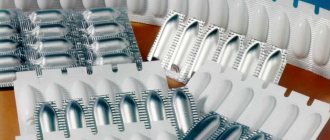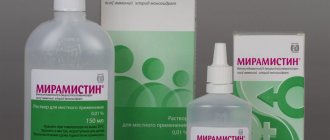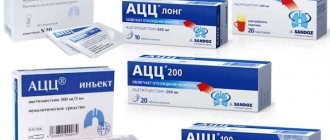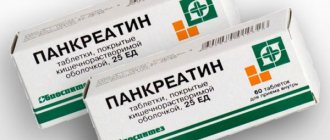What is "Viferon"
This is a medicine with antiviral, immunomodulatory properties, belonging to the group of interferons. For women, this drug is prescribed during breastfeeding. Unlike other medications, Viferon does not pose a threat to infants.
Main components
The clinical effectiveness of Viferon is due to the combined effect of antioxidants in the form of vitamins E, C and alpha-2b interferon (recombinant). When an infection enters the body, immune cells produce interferon. It fights viruses and bacteria.
During lactation, a woman gets sick if it is not produced enough.
In this case, Viferon is prescribed; it helps the female body fight infection and stimulates the immune system.
Impact on the body
Taking Viferon during lactation increases a woman’s immunity and helps it fight infection. This remedy has no therapeutic effect. That is why it has no harmful effects on the female body and is safe for the baby.
Interferon, which is part of Viferon, has an indirect effect. There is no direct effect on viruses. It activates lymphocytes (T-cells, B-cells), creating unfavorable conditions for the reproduction of viruses.
Release form
The drug is intended for local use (externally, rectally). It is produced in three formats:
- ointment in tubes, jars of viscous consistency, white or slightly yellowish in color with the smell of lanolin, packaged in 6-12 g;
- gel, packaged in tubes, jars, 12 g packaging;
- white rectal suppositories, bullet-shaped, in packs of 10 pcs.
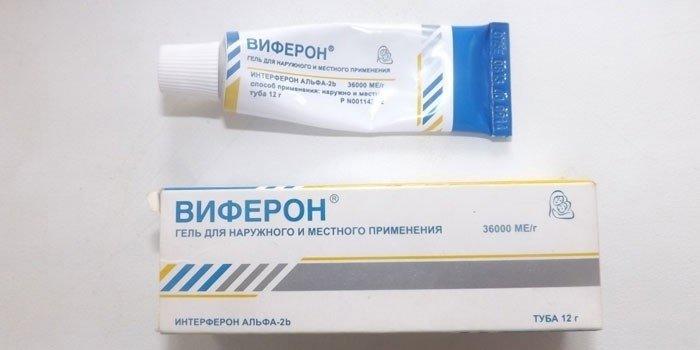
The drug "Viferon" during lactation: the main effect and effect on breastfeeding
After childbirth, a woman’s body is weakened and prone to all kinds of infections, including ARVI, influenza and the like.
Combating a viral pathology is always a little more difficult than fighting a bacterial one due to the fact that the range of medications for the former is much narrower. Therefore, your own immunity plays a significant role.
Viferon is a complex drug with an antiviral effect that helps activate your own cells in the fight against pathology. If Viferon is prescribed for lactation, is it safe and effective enough?
Main components and their effects on the body
Viferon helps a new mother counteract viral pathology, and it also affects some additional pathogenic microorganisms.
The composition of the drug is so formed that each component potentiates the effect of the other. As a result, the total effect is much higher than a single one.
The product is available as suppositories for insertion into the rectum and ointments. Viferon has the following composition:
- human interferon recombinant alpha-a2,
- vitamins E and C.
There are many similar tools. The main active ingredient is interferon. In this drug, it is artificially created; similar proteins are formed in cells immediately after the invasion of viruses. It is thanks to interferon that Viferon is able to stimulate the immune system in the fight against infection.
Interferon acts indirectly, and not specifically on viral particles. It enhances the action of T- and B-lymphocytes, and also reduces the ability of pathogens to reproduce.
Interferon changes the acid balance of cells and enzyme activity in such a way that the vital activity of viruses in them becomes impossible.
After this, they go outside, where they are easily recognized and destroyed by the immune system.
Vitamins C and E strengthen the immune system and help preserve your own cells even if they are infected with viruses. They also have a beneficial effect on the functioning of interferon, enhancing its effect by 10-15 times. It is because of this that smaller doses of the drug can be used for treatment.
Viferon is also capable of stimulating body cells in the fight against chlamydial infection, ureaplasma and some others.
Thus, it becomes clear that Viferon, including during lactation, helps the immune system fight infectious pathogens, and does not directly have a therapeutic effect. That is why the product can be used during pregnancy and breastfeeding without fear of the drug’s effect on the baby.
Watch the video about the action of the drug:
Why is the drug prescribed?
The main indications for the use of Viferon are as follows:
- For combined therapy of various infectious pathologies in adults and children (ARVI, influenza, pneumonia, meningitis and even sepsis).
- For complex treatment of hepatitis of various etiologies.
- For the treatment of herpetic and papillomavirus infections of various locations, including the external and internal genital organs. If the epithelium of the cervix (cervix) or vaginal mucosa is damaged, suppositories are used, but ointment in the form of tampons is also possible.
- For more effective treatment of sexually transmitted diseases (cytomegalovirus, chlamydia, trichomonas, ureaplasma, mycoplasma, candidiasis and similar infections).
- Viferon (ointment) during lactation is used as a therapy for skin and mucous membranes affected by the herpes virus and papilloma. These are condylomas, warts and the like.
Release forms
Viferon is available as suppositories for placement rectally (in the anus), they can also be used vaginally. There is an ointment for applying to affected skin or vaginal tampons.
The dose of the drug in suppositories differs. The following options exist:
- 150 thousand IU in one suppository,
- 500 thousand IU,
- 1 million IU,
- 3 million IU.
tocopherol acetate (vitamin E) and ascorbic acid are the same in all types - 0.055 g and 0.022 g, respectively. Only in suppositories there are 150 thousand IU of vitamin C, 0.015 g of interferon in 1 g of ointment 40 thousand IU, tocopherol acetate - 0.002, and no ascorbic acid.
Contraindications
Many women are interested in whether Viferon can be taken during lactation and whether it will harm the baby. The only contraindication for using the product is individual intolerance to any of the components. Also, you should not use Viferon before the 14th week of pregnancy. In all other cases, this is an absolutely safe and effective treatment.
Allergic reactions such as itching and urticaria at the application sites are rarely observed. If any of these occur, the drug should be discontinued immediately.
How to take for a nursing mother
If Viferon is used during lactation, the dosage and treatment regimen must be prescribed by a doctor, since they largely depend on the general condition of the body and the type of infection. Standard assignments look like this:
- In the complex treatment of uncomplicated acute respiratory viral infections, pneumonia and similar viral infections, as well as if their chlamydial etiology is suspected, suppositories are used in a dose of 150 thousand IU twice a day rectally. If necessary, the course of treatment can be repeated, but not earlier than after five to seven days.
- If Viferon is used in a hepatitis treatment regimen, preference should be given to suppositories of 3 million IU, taking them twice a day for 10 days. Then treatment continues - every other day, and so on for 6 - 12 months.
- Treatment of sexually transmitted pathologies localized to the cervix or vaginal mucosa is most often carried out with suppositories. The classic scheme includes a 10-day course of one suppository twice a day. The most commonly used dose is 1,000,000 IU. In case of recurrent pathology or for other indications, the course can be shortened or lengthened.
- If the affected areas are located on the skin and accessible mucous membranes, you can apply a thin layer of ointment up to 3-4 times a day. In this case, you can rub it a little into the lesions. The average duration of treatment is about a week.
- To prevent ARVI and influenza, you can apply ointment to the nasal mucosa during an epidemic or contact with a sick person.
It is noteworthy that Viferon (suppositories for lactation or ointment) can be simultaneously combined with other drugs and suppositories for the treatment of pathology. Interferon does not in any way reduce the effect of other drugs, but only helps the body fight infection even more actively.
Viferon does not reduce its own production of interferon, it does not cause addiction or other undesirable effects.
We recommend reading the article about antiviral drugs during lactation. From it you will learn about permitted and prohibited medications for a nursing mother, the effectiveness of homeopathic remedies, as well as the use of traditional medicine methods.
Should I stop lactation?
Being cautious, many mothers still clarify whether it is necessary to temporarily stop breastfeeding if Viferon suppositories are used in complex treatment during lactation.
The suppositories themselves will not pose any danger to the baby, but you need to be careful, since in exceptional cases only this one medicine is prescribed. As a rule, this is a whole treatment regimen, often including antibiotics and other serious drugs.
Therefore, in each specific case, you should clarify the prescriptions and their safety with your doctor.
Viferon is a modern and effective drug with immunomodulatory and antiviral effects. It can be used safely during breastfeeding.
There are many regimens and dosages of medication, which only a specialist can adequately recommend, taking into account the clinical situation.
Source: https://GrudInfo.ru/viferon-pri-laktacii/
Why is there no Viferon in tablets or injections?
Interferon is a protein. If it gets into the stomach, it will be affected by gastric juice. This will lead to the breakdown of protein molecules. The active substance interferon will lose its immunomodulatory and anti-inflammatory properties. For this reason, the medicine is not available in tablet form.
Drug interactions
Any medications used during complex treatment are combined with Viferon. It can be used in parallel with antibiotics, glucocorticosteroids, and chemotherapy drugs. It has been revealed that Viferon increases the effectiveness of antiviral agents and antibiotics.

Viferon suppositories for a nursing mother during lactation: correct dosage
13.01.2020 | 1761
Interferon alpha-2 is the main active ingredient of Viferon suppositories; the drug has been quite well studied by both Russian and American medical scientists. All studies show good effectiveness of this substance [1, 2]. In this regard, we can talk about the therapeutic viability of the drug Viferon, which is produced in Russia.
Infections, viruses, and acute respiratory viral infections affect all ages and segments of the population, and women who are in the lactation period are no exception. Insomnia, worries, feeding affect the body's protective functions, immunity decreases. How to protect your body and prevent unwanted substances from penetrating into the milk of a nursing mother and, accordingly, into the child’s body?
The most prescribed drug in pediatrics, gynecology and therapy is Viferon. Can it be used by adults, including nursing mothers? For what diseases is it prescribed? What dosage? What is the dosage regimen? Is it safe to take the drug?
Viferon can be used by both children and adults. The drug is aimed at immunomodulating and combating viruses of various etiologies.
Although the drug is safe even for infants, a nursing woman should not prescribe it to herself.
When purchasing suppositories, a doctor’s prescription is not required, but only a qualified specialist will choose the required dosage and duration of use for a particular case of the disease.
The composition includes interferon alpha-2b in various dosages, additional components: ascorbic acid, polysorbate, tocopherol acetate, cocoa butter, polyunsaturated fatty acids.
Form
Suppositories are elongated, yellow-white, homogeneous, diameter about 10 mm. This shape and size facilitates easy administration of the medication. When using, you must take a horizontal position and remain in it for 10 minutes.
Release form and storage conditions
The drug is packaged in cardboard boxes and individual PVC film packaging, stored at a temperature of +2 to +10 degrees, that is, the medicine should be kept in the refrigerator. Removal from individual packaging is recommended immediately before administering the medicine, since upon contact with the warm skin of the hands, the suppository begins to melt.
Viferon has a fairly long shelf life - 2 years (24 months). [3]
Dosage for women while breastfeeding
Viferon suppositories (suppositories) are prescribed to adults for infectious diseases (Table 1).
Table 1 - Diseases and doses for treatment
| Disease | Dosage | Effect |
| Runny nose | 500,000 ME | The manifestation of symptoms is reduced and the period of the disease is reduced |
| Cystitis | 500,000 ME | Used as an immunomodulator |
| Herpes | 1,000,000 ME; 500,000 ME – pregnant and lactating | Treatment begins at the first symptoms: redness, itching. Relieves irritation, shortens treatment period |
| Inflammation of the urogenital tract | 1,000,000 ME; 500,000 ME – pregnant and lactating | Inhibits the growth of the causative agent of the disease, allows you to reduce the intake of other drugs |
| Flu, ARVI | 500,000 ME | Helps normalize temperature, reduce intoxication and symptoms of the disease [5] |
| Preventative treatment | 500,000 ME | During periods of decreased immunity, they are used to maintain it [5] |
The table clearly shows that Viferon is used for various diseases in therapy, including for lactating women. The main condition is compliance with the dosage of the drug. Viferon supports the immune system and is practically not absorbed by the body.
Effect on breast milk
The components that make up the suppositories pass into breast milk in minimal quantities, so the drug is acceptable for use during lactation.
The main dosage for nursing patients is 500,000 IU, which corresponds to the content of the active substance - human recombinant interferon alpha-2b 500,000 IU.
Why is the drug prescribed?
During the period of breastfeeding, Viferon is prescribed to women for the purpose of prevention and during complex treatment of acute respiratory viral infections and influenza. It is indicated for a number of viral diseases:
- hepatitis;
- inflammation of the urinary canal and genital organs;
- herpes;
- condyloma;
- pneumonia;
- meningitis.
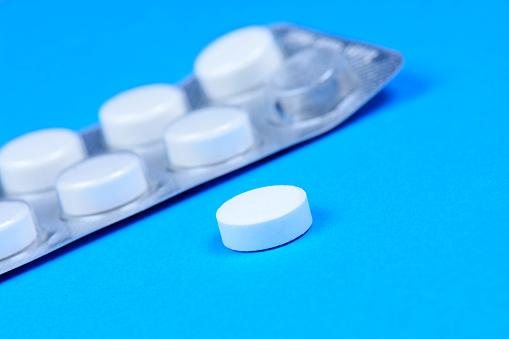
Dosage
| Disease | Form | Norm | Scheme |
| ARVI, pneumonia | Rectal suppositories | 150 thousand ME | 2 times a day |
| Hepatitis | Rectal suppositories | 3 million ME | During the first 10 days, 2 suppositories daily, the next 6-12 months every other day |
| Genital tract infections | Vaginal suppositories | 1 million ME | 10 days, 2 times a day |
| Infectious skin inflammations | Ointment (gel) | Apply a thin layer to the affected area | 3-4 times a day for a weekly course |
| During epidemics of influenza, ARVI for their prevention | Ointment (gel) | On the inner surface of the nose | Before visiting crowded places or contacting sick people |
Viferon during lactation: instructions for use for nursing mothers
Nursing mothers are most susceptible to various viral diseases because they do not have time to get stronger after childbirth and spend resources on milk production.
This group should take the choice of medications very seriously, since some medications can be excreted in breast milk and adversely affect the health of the baby.
Viferon during lactation is the most suitable antiviral drug.
Composition and purpose of the drug
Several types of product are produced. Two are applied to the skin. We are talking about ointment and gel. The third release option is candles. They are administered rectally.
The composition of the drug is presented:
- artificially synthesized interferon alpha 2b, called recombinant;
- vitamin E;
- ascorbic acid (vitamin C).
Additional components are:
- cocoa butter;
- confectionery fat;
- sodium ascorbate.
Reception of Viferon is indicated:
- For respiratory and urogenital infections, influenza and parainfluenza, pneumonia, cytomegalovirus, enteroviral disease, herpes.
- In the comprehensive fight against viral hepatitis.
- For cirrhosis of the liver.
Advantage ointment is used on the skin, for example, for herpes, papillomavirus. The ointment can also be used vaginally by applying it to vaginal tampons.
The gel is used to treat the mucous membranes of the nose, where a film is created that represents a barrier to the penetration of pathogens.
Suppositories can be used both rectally and vaginally. The production of candles is carried out in different dosages (150,000, 500,000, 1,000,000, 3,000,000 international units).
Viferon is also used to prevent viral diseases. This is relevant in case of direct contact with an infected person during seasons of increased flu incidence.
Operating principle of Viferon
Interferon is known as an antiviral and immunostimulating agent. The effect on the body is indirect, that is, it activates internal defense, which inhibits pathogenic agents. The action of the medicine is as follows:
- Increasing the activity of cellular enzymes makes it impossible for pathogens to reproduce. In this regard, the viruses die. Interferon, leaving the affected cell, notifies neighboring cells of the danger and prevents the infection from spreading.
- Interferon activates protective blood cells (macrophages), suppresses excessive proliferation and growth of malignant tumors.
- Due to the content of vitamin C in the preparation, the antiviral effect is enhanced several times.
- Vitamin E is a powerful antioxidant that helps protect the body from free radicals. The action of vitamin E is based on providing an anti-inflammatory and regenerating effect.
Due to the fact that the drug does not have a direct therapeutic effect, but indirectly by increasing the body’s own defenses, the prescription of Viferon to a nursing mother is completely justified. There is no risk of negative impact on the baby.
Taking Viferon allows you to reduce the dosages of other drugs used in treatment and shorten the duration of therapy.
Use of Viferon during lactation
The prescription of the drug, selection of dosages, regimen and duration of treatment is carried out only by the attending physician. The required doses of the drug are selected individually. This is due to the nuances of the disease, the type of infection, and the condition of the body. Wherein:
- The ointment is applied to the affected skin four times a day. It is recommended to use the product when rashes appear. The course of treatment for herpes and human papillomavirus infection usually lasts from 5 to 7 days.
- The gel is used to lubricate the nasal passages during the cold season to prevent the development of the disease. The gel can be used as a prophylactic agent in children from birth.
- Viferon suppositories for breastfeeding are prescribed by a doctor as part of a comprehensive treatment. The appointment is carried out under the supervision of the attending physician.
The dosage of Viferon during lactation when infected with viral infections or influenza is 500 thousand IU (international units). Administer 1 suppository 2 times a day. Therapy lasts from 5 days to a week. The timing depends on the severity of the disease.
For uncomplicated viral infections, a dosage of 150 thousand IU can be used. Candles are placed 2 times a day for at least 5 days.
If sexually transmitted infections are detected, therapy lasts at least 10 days. Suppositories are given 2 times a day. The required dosage is 1 million IU.
The treatment regimen for hepatitis involves a dosage of 3 million IU.
The break between courses of treatment should be 5 days. Based on the results of the doctor’s examination, the need to continue taking the medication is determined.
When taking Viferon, the body's synthesis of its own interferon is not suppressed and does not cause addiction.
Should I stop breastfeeding?
When assessing the possibility of using Viferon during breastfeeding (breastfeeding), women often worry about their newborn. Mothers want to know whether the medicine will worsen his health.
Viferon itself does not have a negative effect on the baby and is practically not excreted in breast milk. However, the drug is often prescribed in combination with other medications. They can be harmful to babies. It is necessary to clarify with the doctor the nuances of administration and the effect on the child.
If only Viferon is taken, feeding is not interrupted. Continuing lactation allows the baby to eat well. Important substances are transmitted with milk to enhance the baby’s immunity.
Weaning can negatively affect not only the child’s health, but also prolong the mother’s recovery process. This is partly due to the increased risk of complications.
There are no special rules for breastfeeding in case of infection with acute respiratory diseases. However, please note that milk:
- should not be expressed;
- there is no need to boil, thereby worsening its beneficial and nutritional properties.
Interruption of feeding is provided if it is necessary to take antibiotics and other potent medications. They can harm the child's body. In this case, you need to express, throwing away the milk. The baby is transferred to adapted formulas.
The baby’s health is interconnected with the mother’s health, since it is through milk that the baby consumes the nutrients he needs, which increase the body’s defenses.
Doctors' recommendations
Viferon suppositories are safe during lactation and have proven themselves in the treatment of both adults and children. The only contraindication to taking the drug is individual sensitivity to the constituent components, in most cases to cocoa. Its oil serves as the base for candles.
In order to prevent adverse reactions, the following rules should be followed:
- do not diagnose and treat yourself;
- seek help from a specialist;
- strictly follow the instructions and prescriptions of the attending physician.
If any unpleasant symptoms appear during treatment with Viferon, you should stop taking the medication and seek help from a specialist.
Viferon is sold in pharmacies without a doctor's prescription, but this does not mean that the drug can be taken uncontrolled, especially by nursing mothers. Self-medication can lead to adverse consequences. It should be remembered that in such a situation the mother puts not only herself, but also her child at risk.
The medicine should be stored in its packaging in the refrigerator. Under no circumstances should you use a drug that has expired.
Despite the effectiveness and safety of some medications, it should be remembered that it is easier to prevent a disease than to treat it. To prevent the occurrence of diseases, it is recommended:
- Eat nutritiously and properly, rest.
- Walk outdoors more often.
- Follow recommendations for the prevention of colds.
While breastfeeding, Viferon ointment or gel should not be applied to the breast area, nipple and areola.
Patient reviews
Reviews from women who took Viferon while breastfeeding are mostly positive. Patients note:
- the effectiveness of the drug against viral and infectious diseases;
- reduction of treatment time;
- improvement in condition after the first day of using the drug;
- in most cases, the medicine was easily tolerated, without causing any adverse reactions in either the mother or the child;
- effectiveness when the first signs of herpes and papillomas appear.
The advantage of the medicine is the possibility of its use for preventive purposes, in case of contact with a sick person or to prevent infection during the cold season. In most of these cases, infection did not occur or the disease proceeded in a fairly mild form.
However, you can also find negative reviews about the drug on the Internet. Some patients write that they did not notice any effect from using Viferon.
Source: https://gepatit.su/lechenie/preparaty/viferon-pri-laktatsii
Method of use
The drug is used topically. For viral skin lesions, areas of inflammation are covered with a thin layer of ointment (gel). Rub it in carefully in a circular motion. To avoid infection, a woman can cover her nasal mucosa with Viferon ointment before a walk.
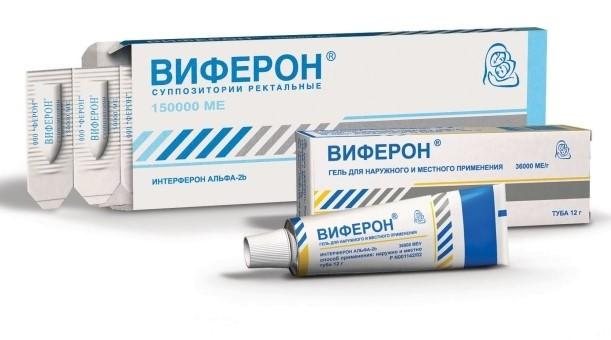
For viral inflammation of the upper respiratory tract, suppositories are prescribed. They are inserted into the rectum. The exact daily dose and duration of treatment is determined by the doctor. Urogenital infectious and inflammatory diseases (candidiasis, chlamydia, mycoplasmosis) are treated with suppositories. It is carried out in 5-day courses. They are repeated if necessary after a week's break.
Instructions for breastfeeding
A woman during breastfeeding should visit a doctor if signs of illness occur. He determines the nature of the disease and assesses the general condition of the woman. If necessary, prescribe Viferon.
For the treatment of acute and chronic inflammation during hepatitis B, suppositories are prescribed. The amount of interferon in suppositories is different: 150, 500 thousand ME and 1 or 3 million ME. When treating acute respiratory viral infections and influenza, mothers are prescribed suppositories of 150 thousand IU. To treat hepatitis, a higher concentration is used - 3 million IU.

Suppositories and Viferon ointment do not affect the quality of breast milk. It is recommended to administer suppositories in the morning (before getting out of bed) and evening (20-30 minutes before bedtime). The required concentration of interferon in the blood is maintained for 12 hours.
Is it possible to use VIFERON suppositories while breastfeeding?
But what to do if a nursing mother is overtaken by a viral disease that requires drug treatment, and it is undesirable to interrupt feeding the child? The same acute respiratory viral infections in the form of flu and colds are quite common in everyone, including women who have recently given birth. In this case, you should pay attention to the antiviral drug VIFERON, which is available in the form of suppositories, ointment or gel. You can use VIFERON when feeding an infant. The drug has a dual effect - it helps block the virus and restore immunity. The original formula of the drug is a combination of interferon alpha-2b and highly active antioxidants (vitamins C and E). The drug has a universal effect against a wide range of viruses and other pathogens.
The drug carefully takes care of women’s health and allows them not to interrupt the feeding of the child during the course of treatment. It is advisable to start using suppositories when the first signs of the disease appear, but at a later date their use will be justified.
Instructions and dosages of the drug VIFERON Suppositories for lactation
For ARVI and influenza, it is recommended to use the drug VIFERON Suppositories when breastfeeding at a dosage of 500,000 IU for 5 days. For herpes infection - at a dosage of 1000,000 IU for 10 days. Urogenital infections, including human papillomavirus infection, require treatment with the drug at a dosage of 500,000 IU for 5-10 days.
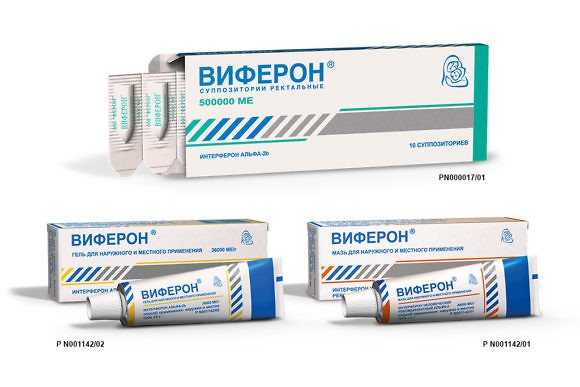
Should I stop lactation?
Mothers are careful when it comes to Viferon. They are wondering whether it is possible to continue giving breast milk during treatment. Suppositories administered rectally are absolutely safe for babies.
It is necessary to clarify the compatibility of breastfeeding with other medications that are included in the treatment regimen.
In difficult cases, in addition to Viferon, which restores natural immunity and suppresses viruses, nursing women are prescribed other potent medications.
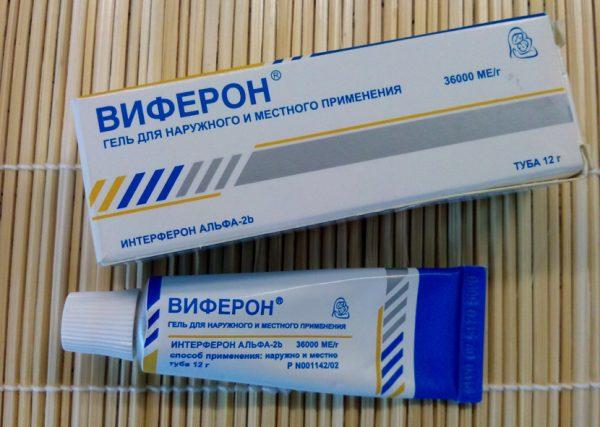
Is it possible to take Viferon during breastfeeding?
Breastfeeding women are especially susceptible to weakened immunity. Treatment of colds is complicated by the limited number of remedies that can effectively help the mother without harming the baby. Is it possible to take the drug during pregnancy and breastfeeding?
Doctors recommend using the substance for therapy for hepatitis B. The product does not penetrate into milk and does not negatively affect the baby’s health. During the first day of use, the number of protective antibodies in the body increases.
The product is not addictive, does not cause allergies, and has no side effects. A slight inconvenience is caused by the peculiarity of storage in the refrigerator. Many have a negative attitude towards the introduction of suppositories, although this is the safest use.
We recommend reading: Mucaltin during breastfeeding
Despite the free access to sale, loyal pricing, it is necessary to consult a doctor before use.

